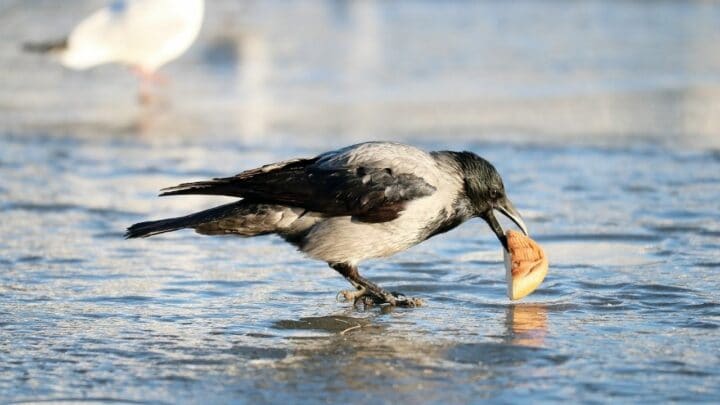Crows are the astute opportunists of the bird world, and their intelligence is perhaps most profoundly observed through their advanced scavenging abilities.
These enigmatic omnivores have very diverse dietary tastes and will adapt to eat whatever is available.
However, as fall turns to winter, their usual selection of sustenance may not be quite as freely available.
What do crows eat in winter?
In winter waste grain, nuts, fruits, vegetables, seeds, and eggs comprise a large portion of a crow’s diet. Crows are also known to hunt insects and small mammals that cannot survive the cold. When available, they will scavenge through human garbage for leftover foodstuffs. Crows are among the many birds that hide and store seeds for winter.
What Food is Available for Crows in Winter
In spring and summer, crows like to forage in the grass for various insects and pests such as beetles, aphids, worms, and craneflies.
However, the descent of cold weather may jeopardize this, as frost and snow make grass foraging far less accessible.
Therefore, during the winter months, crows consume plenty of waste grain, left behind after harvests or discarded. In addition to this, they may consume walnuts, hazelnuts, pecan nuts, and other winter-hardy nuts that they have access to.
The same goes for winter vegetables and fruits. Crows eat over 650 different types of food and will not pull their beaks up at sumptuous fruit and veggies that catch their eye.
Like many other animals, crows also tend to eat other birds’ eggs. Should they come across a nest with eggs, they will not hesitate to snack on them.
Do Crows Hunt Other animals During Winter
Crows may hunt for insects in winter by digging for them. They will also continue to eat amphibians and other reptiles if they come across them.
Studies have shown that crows will hunt and kill small mammals, like squirrels and other animals unable to withstand cold and freezing temperatures.
They also, on occasion, kill nestlings, and rarely, other adult birds.
Why Crows Scavenge in the Trash
Crows have a penchant for going through human rubbish and will even go so far as to open trash bags to see what they can find to eat.
This is especially true in winter when their usual dietary preferences are not as easily met as during the year’s warmer months.
Generally, human food comprises foodstuffs that crows enjoy in the wild, such as grain products, fruits, vegetables, and seeds.
Humans also regularly discard dairy and meat scraps, which serve as a delicious treat for these unfussy animals.
Do Crows Store Food for Winter
Many types of birds, including crows, store food for the cold winter months. This is also called caching.
Crows are so intelligent and sly that they can store hundreds of seeds in time for winter. Furthermore, they always remember where they have hidden them and will have no issues finding their treasure when needed.
What can I feed Local Crows in Winter
If a friendly human is feeding crows, they can stick to giving them the same treats all year round, irrespective of the season.
Fruit, veggies, seeds, nuts, meat scraps, boiled eggs, and dog and cat kibble are all good options. One should avoid giving crows junk food or food loaded with salt, additives, and preservatives.
This goes without saying, but once crows know that a specific garden or yard to be a spot for collecting food, one is likely to end up with a band of crow friends on their hands.
Do Crows Need Access to Water in Winter
Crows require a lot of water in general, and this is more pertinent during winter when there is a chance that their existing water sources may freeze over.
In particular, a lack of water can be dangerous to them during cold, dry spells devoid of snowfall.
To assist your neighborhood crows with access to water, one can consider providing them with a birdbath that is regularly filled or warmed to prevent freeze.
Frequently Asked Questions about What Crows Eat in Winter
Why do I see so many crows together in winter?
Crows roost together in winter and may start to travel around in big flocks. This has to do with the freezing weather and the food availability. Roosting close together also creates more heat among them to keep them warm. When chicks are born, crows have been known to help one another rear their young.
Do crows migrate in winter?
Some species do, and others do not. Researchers believe that over 75% of crows will travel to warmer areas to escape the cold, but more importantly, to breed. In urban areas, a sudden increase in the crow population is indicative of crows having migrated for winter.
Do crows benefit crops?
Crows can be beneficial to have around crops. They feed off insects, pests, and rodents that cause harm to grain plants. They also love waste grain, and clearing this up for farmers can be helpful, especially before the next growing season. Crows also like to consume carrion, which attracts other pests to crops if left around for too long.
Conclusion
Although crows may not be everyone’s cup of tea, it’s hard not to be impressed by them.
They are smart and capable and will go to great lengths to protect one another and their young during winter.
Fortunately, these big black brats are hardly what one would consider picky, which goes a long way to keeping them safe and thriving in the cold.


